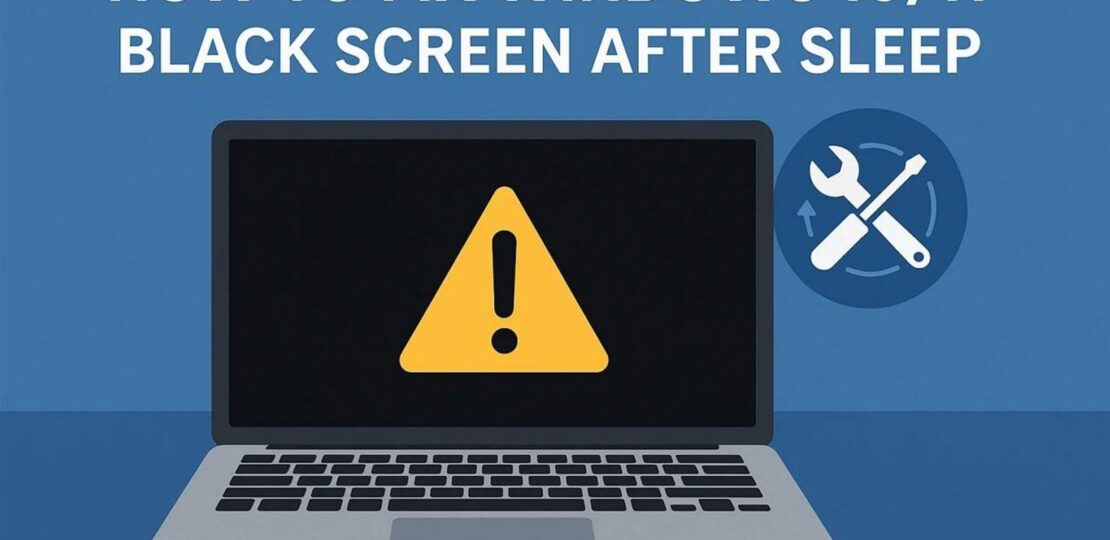How to Fix Windows 10/11 Black Screen After Sleep and Recover Lost Data
July 29, 2025 | by Admin

As a corporate employee or IT student, you heavily rely on your Windows 10/11 computer for carrying out essential tasks. Its versatility in sleep mode allows users to resume work while saving energy quickly. However, when you are faced with a black screen in sleep mode after a Windows 11 update, it interrupts your productivity. This article will explore all possible reasons and methods to resolve the issue.
Part 1. Why Does the Black Screen After Sleep Happen?
Instead of rummaging for solutions blindly on the “black screen in sleep mode after a Windows 11 update” issue, learn the various reasons behind it:
- If the new updates introduce security protocols or bug patching options, they can sometimes trigger an unintentional black screen.
- When your graphics, chipset, or display drivers become outdated or faulty, they may fail to work properly after sleep.
- App Readiness can interfere with the wake process of Windows, resulting in a slow resume time or a black screen.
- Any corrupted registry entries related to the power settings can block the normal functioning of the computer.
- Malicious software alters drivers and creates a conflict that prevents the smooth transition of Windows.
Part 2. 8 Proven Ways to Fix the Black Screen After Sleep in Windows 10/11
The following are the best methods to fix the black screen on sleep mode after a Windows 11 update:
Disable Fast Startup, Hibernation, and Hybrid Mode
These settings can cause conflicts with the system states, so disabling them can prevent partial hibernation and a black screen. Besides, it ensures a cleaner and more reliable resume process on Windows.
- Step 1. Open “Power Options” > Tap “Choose What the Power Buttons Do” option on the left panel.

- Step 2. On the next screen > click “Change Settings That Are Currently Unavailable.”

- Step 3. Now, under “Shutdown Settings,” > Uncheck the “Turn on Fast Startup” and “Hibernate” options and press “Save Changes.”

Disable App Readiness
This background program service can sometimes delay or block Windows from starting up or interfere with the startup process. By disabling it, you can reduce boot time and reduce the chances of a black screen.
- Step 1. Open the “Search” bar > Type and open “Services” > Double-click the “App Readiness” option.

- Step 2. Access “General” > Choose the “Disabled” option under the “Startup Type” section > Tap “OK.”

Change Registry Keys (Advanced Users)
With specific edits, like modifying Winlogon values, you can directly fix the black screen on sleep mode after a Windows 11 update. Users can easily correct low-level configuration issues without requiring advanced troubleshooting.
- Step 1. Press the “Win + R” keys > Type “regedit” in the “Open” box > Click “OK.”

- Step 2. After that, follow the path HKEY_LOCAL_MACHINE > SOFTWARE > Microsoft > Windows NT > CurrentVersion > Winlogon.

- Step 3. From here, double-click “Shell,” > Enter “explorer.exe” in the “Value Data” section > Press “OK.”

Update BIOS
An updated BIOS significantly improves hardware compatibility with Windows and levels the firmware. Moreover, it can resolve deep-seated system issues and prevent any disturbing wake cycles and abnormal Windows behavior.
- Step 1. Restart the computer > Hold the “Del” key to enter the BIOS interface. Expand the “Advanced” tab > Choose “UEFI BIOS Update,” > and click “Enter” under the “UEFI BIOS Update” option.

- Step 2. When the “Select File System” dialogue box opens > Choose a suitable location > Press “Enter.” After that, choose the BIOS file > Tap “Enter.”

- Step 3. Press “Yes,” and again hit “Yes” on the other “In-BIOS Updating” dialogue box. After the system restarts, proceed with Flash Update and press anywhere to get the updated BIOS version.

Update Graphics Card Driver
An outdated driver frequently causes a black screen on sleep mode after a Windows 11 update due to improper handling. Therefore, updating ensures the GPU interacts properly with Windows’ power status.
Instructions: Access “Device Manager” > Expand the “Display Adapters” option >Right-click a driver to choose “Update Drivers” from the drop-down menu.

Uninstall Problematic Software
When you install unnecessary software or apps, it can interfere with the system’s startup and display process. So, it’s recommended to remove them and eradicate the triggering event of a black screen.
Instructions: Open “Control Panel” > Select the “Programs and Features” option > Right-click on the problematic software and press “Uninstall.”

Disable Onboard Graphics
You need to prioritize discrete graphics and disable any onboard graphics to eliminate driver conflict. Furthermore, this way ensures a consistent display and displays a smooth wake-up screen after sleep.
- Step 1. Open “Run” dialogue box by pressing the “Win + R” keys > Enter “devmgmt.msc,” > and click “OK.”

- Step 2. Go to the “Device Manager” window, right-click any onboard graphics, and tap “Disable Device” from the menu.

Part 3. What to Do If You Lose Data After a Black Screen Incident?
There are times when a black screen on sleep mode after a Windows 11 update can lead to missing and corrupted files. It can be due to abrupt shutdowns, crashes, and wake cycles that interrupt the ongoing operation. Due to such an unstable system state, you can risk overwriting or losing data. That’s why it’s necessary to look for recovery solutions for a successful retrieval of important files.
Part 4. Recover Lost Data with Wondershare Recoverit [Ultimate Solution]
One of the best data recovery software programs is Wondershare Recoverit, which seamlessly recovers lost data with its advanced recovery technology. With its filter options, you can narrow down the scan by adding file type, file name, and date. Moreover, it offers users a deep and quick scanning process that searches every corner for their lost files.
After retrieving the files, you can preview them to ensure nothing is left behind before downloading. This software does not overlook even a fragment of the missing file and restores it without overwriting any content.
Key Features
- You can recover over 1000 file types from over 2000 storage devices, like NTFS, FAT, and more.
- This data recovery software for Windows works with any system crash and black screen scenarios.
- It is a user-friendly program that can resolve black screen issues in just 3 steps, offering a 99.5% high recovery rate.
Part 5. Step-by-Step: How to Recover Files Using Wondershare Recoverit?
Scenario 1. Windows Boots Successfully
If the black screen issue has been solved successfully, you can easily get the lost data back using Wondershare Recoverit:
Step 1. Select a Location to Start the Recovery Process
Open the “Hard Drives and Locations” tab on Wondershare Recoverit and choose a drive to start the file retrieval process.

Step 2. Scan the Drive
Click on the drive to begin scanning for your lost files. The scan’s speed will vary depending on the drive’s size and the amount of data stored on it.

Step 3. Preview and Recover the Missing Files
After the scan, click “Preview” to verify that the recovered files are intact and working correctly. If you’re satisfied, hit the “Recover” button to save them. Always choose a different location to save your recovered files to prevent overwriting any remaining lost data.

Scenario 2. Windows is Still on a Black Screen
If your Windows computer is stuck on a black screen and you need to access its data, Wondershare Recoverit can help you boot your computer from a USB drive and perform a data recovery.

Here’s what you’ll need:
- Another working computer.
- A blank USB drive.
- Wondershare Recoverit downloaded and installed on the working computer.
Step 1: Create a Bootable Media
Connect the blank USB drive to your working computer, making sure it’s recognized. Launch Recoverit and navigate to the System Crashed Computer tab. Select your USB drive to create the bootable media, then click “Start” to begin the process.

Step 2: Boot the Black Screen Computer
Insert the created bootable USB drive into the black screen computer and restart it. Follow the on-screen instructions to boot your computer from the USB drive.

Step 3: Recover Your Data
Once your crashed computer successfully boots, you’ll see options to either perform a Hard Disk Copy or Data Recovery to access your data. Always choose a different location to save your recovered files to prevent overwriting any remaining lost data.

Conclusion
In summary, this article examined the best 8 fixes for the black screen on sleep mode after the Windows 11 update issue. Aside from fixing, data protection is also important, as these fixes can corrupt or lose your essential files in the process. Therefore, turn to Wondershare Recoverit to safely restore those lost files from the system with a 99.5% restoration rate.
RELATED POSTS
View all


